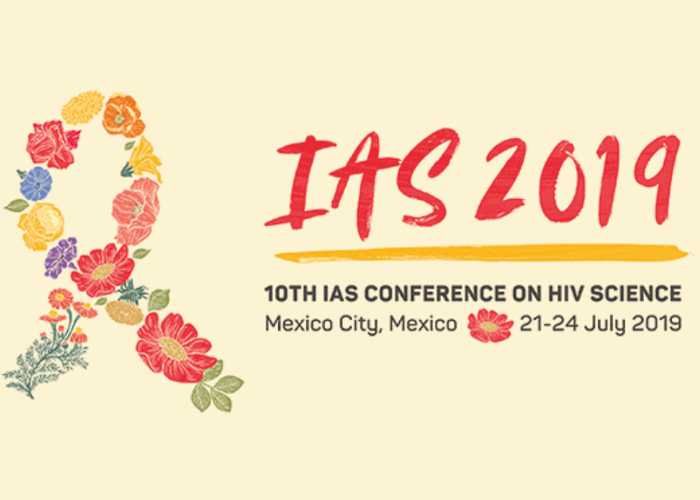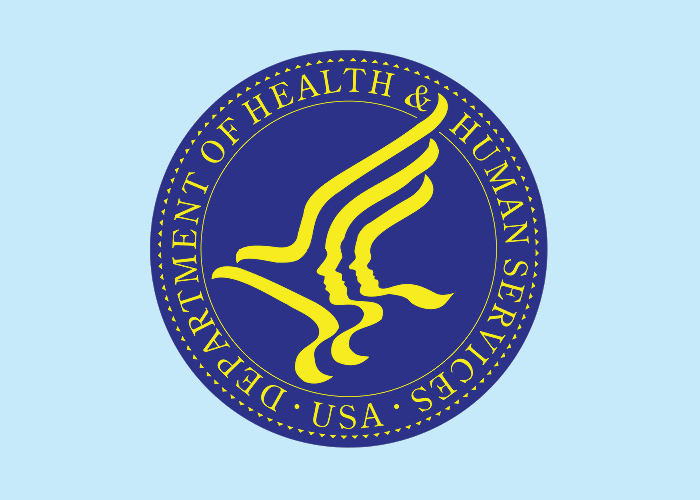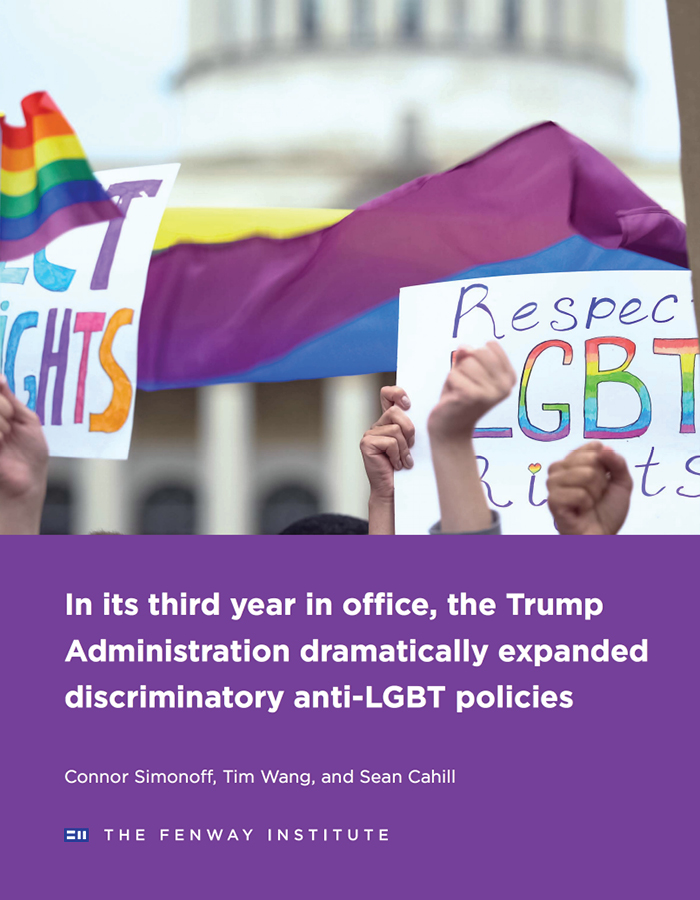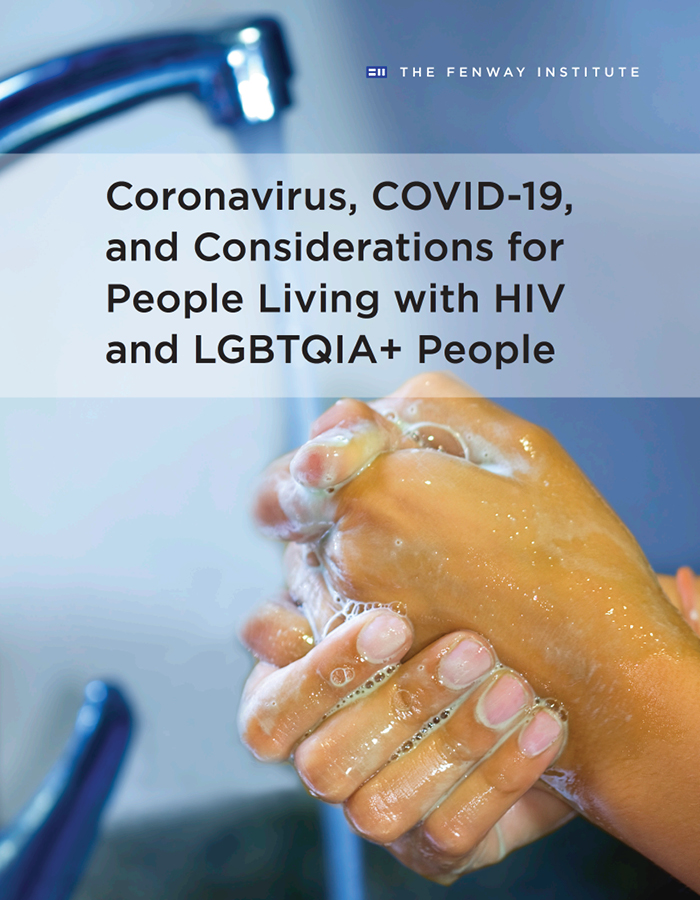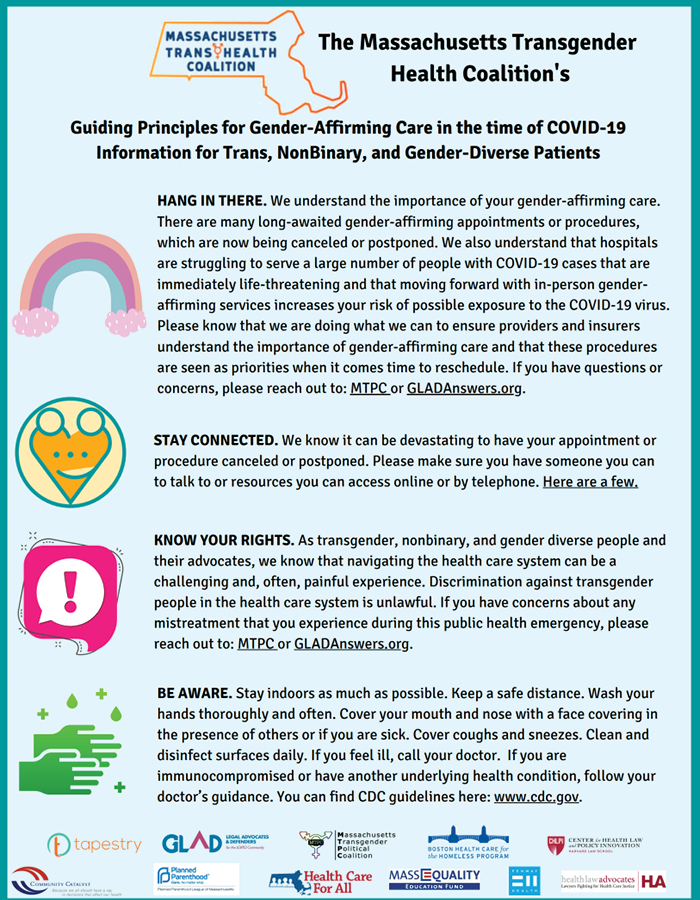ADVOCACY
By publishing policy briefs, submitting public comment and testimony, writing op/eds, participating in media interviews, and joining coalitions in partnership with other institutions, Fenway Health staff and affiliated researchers and scientists engage in broad efforts to advance and disseminate LGBTQIA+ and HIV-related health policy research. During fiscal year 2020, Fenway programs, publications, staff experts, and events were featured in nearly 2,300 news stories, including in outlets like:
Highlights of our policy work included the following:
In July, 2019
Fenway sent a team of scientists and researchers to the International AIDS Conference in Mexico City, Mexico. Led by Kenneth H. Mayer, M.D., Medical Research Director and Co-Chair of The Fenway Institute, the team presented research on the socio-demographic characteristics of long term PrEP users; strategies for reaching the most challenging people to keep engaged in HIV care due to co-morbid mental disorders, substance use, STIs, and other barriers such as poverty, interpersonal violence, and social exclusion; the use of music as an alternative treatment for chronic pain and substance use disorder among people living with HIV; and the factors associated with condomless sex.
The Fenway Institute published “New rule proposes removal of LGBT nondiscrimination provisions from Section 1557 and other health care regulations,” a report outlining the potential impact of the repeal of the nondiscrimination provisions of the Affordable Care Act.
Fenway Health submitted testimony to the Massachusetts state legislature’s Joint Committee on the Judiciary in favor of “An Act to Ensure Right to Counsel in Eviction Proceedings” and “An Act Establishing a Right to Counsel in Certain Eviction Cases” because both bills would ensure access to legal representation for those facing eviction, which would improve their ability to maintain a stable housing environment. Stable housing maximizes healthier outcomes for those who are living with HIV/AIDS, those who are at risk, and the overall population of people experiencing housing instability.
Sean Cahill, the Director of Health Policy Research for The Fenway Institute, authored an oped for The Boston Globe on the need for legislation to protect incarcerated LGBTQIA+ from discrimination by Department of Corrections employees.
In August, 2019
Fenway submitted Public Comment to the U.S. Department of Health and Human Services Office for Civil Rights on the office’s Proposed Rule regarding Nondiscrimination in Health and Health Education Programs or Activities. Fenway expressed opposition to the proposed rule because it would reverse the 2016 final rule implementing Section 1557, the nondiscrimination provision of the Affordable Care Act (ACA) which explicitly prohibits gender identity discrimination, including discrimination against intersex and non-binary people, in health care facilities and programs receiving federal funding.
Fenway submitted testimony to Congress in support of an amendment to Washington D.C. law that would add LGBTQ Older Adults and older people living with HIV to the targeting language of programs under the Older Americans Act.
Fenway submitted testimony to Congress in support of the Dignity for Detained Immigrants Act which would protect LGBTQ people from arbitrary detention and violence within facilities and ensure their right to seek protection within the United States.

In September, 2019
Fenway submitted Public Comment to the Center for Medicare & Medicaid Services regarding Medicare and Medicaid Programs; CY 2020 Home Health Prospective Payment System Rate Update; Home Health Value-Based Purchasing Model; Home Health Quality Reporting Requirements; and Home Infusion Therapy Requirements. Fenway expressed strong support for the proposed inclusion of sexual orientation and gender identity in the patient assessment data elements.
Fenway submitted Public Comment to the U.S. Division of Labor’s Office of Federal Contract Compliance Programs (DOL OFCCP) regarding Implementing Legal Requirements Regarding the Equal Opportunity Clause’s Religious Exemption. Fenway expressed strong concerns that this proposed rule would harm American workers, and LGBT workers in particular, by allowing a wider range of federal contractors to discriminate against LGBT people under the pretext of religious freedom.
Fenway submitted Public Comment to the HRSA Information Collection Clearance Office regarding Information Collection Request Title: Health Resources and Services Administration Uniform Data System. Fenway commented on four proposed changes that would increase linkage to care for individuals living with HIV.
Fenway Health submitted testimony to the Massachusetts state legislature’s Joint Committee on State Administration in favor of “An Act providing for a gender neutral designation on state documents and identifications” and “An Act Relative to Gender Identity on Massachusetts Identification” because both bills would allow a person to change their gender marker without obtaining a medical care provider’s letter attesting that they have undergone surgery or any other form of treatment and being able to do this is a critical step towards true gender equality in Massachusetts.
Fenway Health submitted testimony to the Massachusetts state legislature’s Joint Committee on Children, Families, and Persons with Disabilities in favor of “An Act relative to parentage to promote children’s security” because the bill would update existing Massachusetts law to ensure that all children and families have equal access to establishing parentage, and because the bill would also correct discrimination that exists in current state law.
Fenway Health submitted testimony to the Massachusetts state legislature’s Joint Committee on Elder Affairs in favor of “An Act relative to Massachusetts home care eligibility” because the bill would promote health equity by ensuring long term survivors have the same access to healthcare services they need to age with dignity as their HIV negative peers.
Fenway Health submitted testimony to the Massachusetts state legislature’s Joint Committee on Mental Health, Substance Use, and Recovery in favor of “An Act advancing public health and safety using fentanyl testing strips,” because the bill brings attention to the presence of fentanyl in the drug supply and the need for harm reductions measures to combat its deadly consequences.
Fenway Health submitted testimony to the Massachusetts state legislature’s Joint Committee on Mental Health, Substance Use, and Recovery in favor of “An Act helping overdosing persons in emergencies,” because the bill would ensure that those responding to calls requesting assistance with someone who may have overdosed on opioids have the tools needed to save lives.
Fenway Health submitted a letter to Congresswoman Ayanna Pressley requesting assistance in addressing recent actions by drug manufacturers Eli Lilly, Merck, and Sanofi to amend the 340B drug discount program which requires drug manufacturers who participate in Medicaid and Medicare to provide discounts on the price of outpatient pharmaceuticals purchased by “safety net” providers, such as Fenway Health and other federally qualified community health centers.
Sean Cahill, the Director of Health Policy Research for The Fenway Institute, authored an oped for The Cedar Rapids Gazette about the ways in which an historic LGBTQ issues forum among Democratic presidential primary candidates highlighted how they would govern differently from President Trump.

In October, 2019
Fenway submitted Letter of Support to the Massachusetts State Legislature in favor of a bill to ban female genital mutilation.
Fenway submitted testimony to the Massachusetts State Legislature in favor passage of “An Act to Collect Data on LGBTQI Prisoners Held in Restrictive Housing.”
Fenway submitted Public Comment to the Center for Medicare and Medicaid Services regarding Request for Information for the Development of a CMS Action Plan to Prevent Opioid Addiction and Enhance Access to Medication-Assisted Treatment. Fenway urged CMS to consider vulnerable populations, including LGBTQIA+ people, that are disproportionately burdened with opioid addiction.
Fenway Health submitted testimony to the Massachusetts state legislature’s Joint Committee on Mental Health, Substance Use, and Recovery in favor of “An Act relative to preventing overdose deaths and increasing access to treatment” and “An Act relative to supervised injection facilities” because both bills would expand harm reduction methods in the state and create a legal framework for supervised consumption sites to save lives in Massachusetts by preventing overdose deaths, increasing access to harm reduction methods, and linking people to treatment.
Fenway Health submitted testimony to the Massachusetts state legislature’s Joint Committee on Public Health in favor of “An Act relative to HIV prevention access for young adults,” “An Act relative to HIV routine screening and care,” and “An Act improving Hepatitis C screening,” because the bills address important barriers to eliminating the transmission of HIV in Massachusetts by achieving unfettered access to care and treatment.
Fenway Health submitted testimony to the Massachusetts state legislature’s Joint Committee on Public Health in opposition to “An Act relative to HLTV 111 tests” and “An Act relative to the exposure of public safety officials to HIV” because both bills are based on outdated information about HIV transmission and post-exposure treatment options and will thus lead to more harm than good.

In November, 2019
The Fenway Institute and published “Emerging Best Practices for the Management and Treatment of Incarcerated Lesbian, Gay, Bisexual, Transgender, and Intersex (LGBTI) Individuals,” a report that identifies emerging best practices in the management of LGBTI people in correctional settings.
In December, 2019
Fenway submitted Public Comment to the U.S. Department of Health and Human Services regarding the proposed rule Office of the Assistant Secretary for Financial Resources; Health and Human Services Grants Regulation. Fenway expressed strong opposition because it would remove regulatory provisions that explicitly prohibit organizations that receive HHS grant funding from discriminating on the basis of sexual orientation, gender identity, sex, and religion. Under this dangerous and exceptionally broad proposed rule, LGBT people, women, people of minority faiths, and non-religious people could face discrimination by a wide range of health and social service agencies that receive funding.
In January, 2020
Fenway submitted Public Comment to the Bureau of Primary Health Care regarding the Public Comment Request, Bureau of Primary Health Care Uniform Data System. Fenway commented on four proposed changes that would increase linkage to care for individuals living with HIV.
Fenway submitted Public Comment to the National Institute of Health regarding Request for Information on the Development of the Fiscal year 2021-2025 Trans-NIH Strategic Plan for Sexual and Gender Minority Health Research. Fenway recommended that additional research is needed on the impact of pro- and anti-LGBT policies and of targeted services on health and well-being to determine what policies and targeted services correlate with greater resiliency, health and well-being and whether health care entities need technical support to implement anti-discrimination policies.
Fenway submitted Public Comment to the Social Security Administration regarding Rules Regarding the Frequency and Notice of Continuing Disability Reviews. Fenway urges the Social Security Administration to reconsider the proposed rule, which could subject beneficiaries to more frequent and burdensome Continuing Disability Reviews leading to loss of life-saving benefits.
The Fenway Institute published “In its third year in office, the Trump Administration dramatically expanded discriminatory anti-LGBT policies,” a policy brief demonstrating that in 2019, the Trump Administration dramatically expanded upon discriminatory, anti-LGBT policies implemented in 2017 and 2018 that are harming the health and well-being of LGBTQIA+ people in America and around the world.
In February, 2020
Fenway submitted Public Comment to the Department of Labor regarding Equal Participation of Faith-Based Organizations in the Department of Labor’s Programs and Activities: Implementation of Executive Order 13831. Fenway expressed strong concerns that the proposed rule would expand religious exemptions that allow for discrimination against LGBTQIA+ people across the U.S.
Fenway submitted Public Comment to the Department of Homeland Security regarding Re: Equal Participation of Faith-Based Organizations in DHS’s Programs and Activities: Implementation of Executive Order 13831. Fenway expressed strong concerns that the proposed rule would expand religious exemptions that allow for discrimination against LGBTQIA+ people across the U.S.
Fenway submitted Public Comment to the USAID regarding Equal Participation of Faith-Based Organizations in USAID’s Programs and Activities: Implementation of Executive Order 13831. Fenway expressed strong concerns that the proposed rule would expand religious exemptions that allow for discrimination against LGBTQIA+ people around the world who are seeking health care and other services from USAID grantees.
Fenway submitted Public Comment to the Department of Veteran Affairs regarding RIN 2900-AQ75—Equal Participation of Faith-Based Organizations in Veterans Affairs Programs: Implementation of Executive Order 13831. Fenway expressed strong concerns that the proposed rule would expand religious exemptions that allow for discrimination against lesbian, gay, bisexual, transgender, queer and intersex (LGBTQI) veterans seeking health care and other services at the VA.
Fenway submitted Public Comment to the U.S. Department of Health and Human Services regarding Ensuring Equal Treatment of Faith-Based Organizations. Fenway expressed strong concerns that the proposed rule would unfairly favor taxpayer-funded religious organizations and expand religious exemptions that allow for discrimination against LGBTQ people in health care and services.
Fenway submitted Public Comment to the USDA regarding Equal Opportunity for Religious Organizations in U.S. Department of Agriculture Programs: Implementation Of Executive Order 13831. Fenway expressed strong concerns that the proposed rule unfairly favors taxpayer-funded religious service providers over the people that are seeking government services. Fenway also noted that the rule eliminates key protections for participants under the guise of religious freedom while inviting employment discrimination by the government funded service providers that are supposed to be serving everyone.
Fenway submitted Public Comment to the Department of Justice regarding Equal Participation of Faith-Based Organizations in Department of Justice’s Programs and Activities: Implementation of Executive Order 13831. Fenway expressed strong concerns that the proposed rule would unfairly favor taxpayer-funded religious organizations and expand religious exemptions that allow for discrimination against LGBTQ people who are disproportionately represented in the criminal justice system.
Fenway submitted Public Comment to the Department of Education regarding Uniform Administrative Requirements, Cost Principles, and Audit Requirements for Federal Awards, Direct Grant Programs, State-Administered Formula Grant Programs, Developing Hispanic-Serving Institutions Program, and Strengthening Institutions Program. Fenway expressed concern that the proposed rule would unfairly favor taxpayer-funded religious organizations and expand religious exemptions that allow for discrimination against LGBTQ students in schools.
Sean Cahill, the Director of Health Policy Research for The Fenway Institute, authored an oped for The Advocate about the Trump Administration’s dramatic expansion of discriminatory, anti-LGBT policies.

In March, 2020
Fenway submitted Public Comment to the Office of the National Coordinator for Health IT regarding the 2020-2025 Federal Health IT Strategic Plan. Fenway expressed support for continuing to collect sexual orientation and gender identity data in health IT systems.
The Fenway Institute published “Coronavirus, COVID-19, and Considerations for People Living with HIV and LGBTQIA+ People,” a report that outlines the ways in which people living with HIV and LGBTQIA+ people are likely to be affected by COVID-19 and the factors that may put them at elevated risk for infection.
Fenway submitted comment to Congress on the Fiscal Year 2021 budget requesting an increase in funding for programs that impact the lives of people living with and at risk of HIV, STDs, hepatitis and TB, as well as full funding for year two of the Ending the HIV Epidemic Initiative.
In April, 2020
In partnership with the Massachusetts Transgender Political Coalition, Fenway Health published “Guiding Principles for Gender-Affirming Care In the Time of COVID-19.”
In partnership with the Massachusetts Transgender Political Coalition, Fenway Health published “Guiding Principles for Gender-Affirming Care In the Time of COVID-19. Tips for Providers.”
In partnership with the Massachusetts Transgender Political Coalition, Fenway Health published “Guiding Principles for Gender-Affirming Care In the Time of COVID-19.Tips for Insurers.”
Fenway submitted Public Comment to the to the U.S. State Department Commission on Unalienable Rights.
Sean Cahill, the Director of Health Policy Research for The Fenway Institute, authored an oped for The Dorchester Reporter about the LGBTQIA+ community and COVID-19.
Sean Cahill, the Director of Health Policy Research for The Fenway Institute, authored an oped for The Advocate about the LGBTQIA+ community and COVID-19.
Fenway sent a letter to House Speaker Nancy Pelosi and Senate Minority Leader Chuck Schumer of the United States Congress to urge them to ensure that during the coronavirus pandemic, all benefits, programs, services and assistance provided through COVID-19 response legislation are open to all persons who are eligible and in need, free from discrimination.
Fenway signed on to a letter to all public health entities at the local, state, and federal levels ensuring nondiscrimination in health care settings, documenting and reporting the impact of COVID-19 on LGBTQIA+ communities, and protecting the economic health of LGBTQIA+ people.
Fenway sent a letter to House Speaker Nancy Pelosi and Senate Majority Leader Mitch McConnell of the United States Congress urging them to enact legislation requiring the collection of sexual orientation and gender identity data in COVID-19 testing.
In May, 2020
Fenway submitted Public Comment to OIRA on Health and Human Services Final Rule: Nondiscrimination in Health and Health Education Programs or Activities. Fenway expressed concern that the proposed rule could result in increased discrimination in healthcare and create additional barriers to accessing necessary medical care for LGBT individuals and other vulnerable populations impacted by this rule. Fenway also noted that given the current global crisis with the COVID-19 pandemic, when access to healthcare is of paramount importance, it would be dangerous and irresponsible to finalize the rule.
The Boston Globe published a commentary from Sean Cahill, the Director of Health Policy Research for The Fenway Institute, about the need for sexual orientation and gender identity data collection in COVID-19 testing.
Fenway sent a letter to United States Senators Elizabeth Warren and Ed Markey and United States Congresswoman Ayanna Pressley urging them to enact legislation requiring the collection of sexual orientation and gender identity data in COVID-19 testing.
In June, 2020
Fenway sent a letter to United States Senators Elizabeth Warren and Ed Markey and United States Congresswoman Ayanna Pressley urging them to enact legislation requiring the collection of sexual orientation and gender identity data in COVID-19 testing.
Fenway submitted Public Comment to the Bureau of Justice Statistics regarding National Inmate Survey in Prison. Fenway expressed support for the decision to collect information on sexuality and gender identity in its latest proposed survey instrument.
Fenway submitted Public Comment to the U.S. Department of Health and Human Services regarding its COVID-19 Laboratory Data Guidance. Fenway expressed strong disappointment that the HHS COVID-19 laboratory data guidance released June 4 does not require the reporting of sexual orientation and gender identity data.
Fenway submitted Public Comment to the UN Commissioner for Human Rights regarding the call for input to a thematic report: The impact of COVID-19 on the human rights of LGBTQ persons, communities and/or populations. Fenway offered the expert opinion that in order to best understand the impact of the COVID-19 pandemic on LGBTQ people’s health outcomes and access to resources, governments must systematically collect and report the sexual orientation and gender identity data of individuals tested for or diagnosed with COVID-19.













